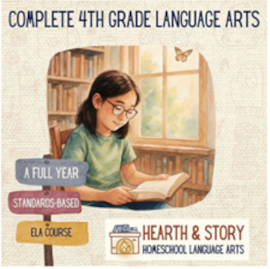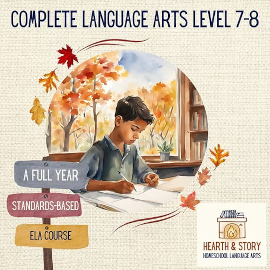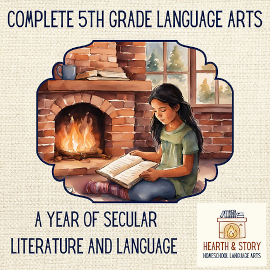Hearth & Story plans to develop complete language arts programs for those wanting secular resources. They began with fifth grade and have expanded to cover grades four through eight with programs that include grammar, writing, spelling, literature, poetry, and vocabulary. The study of novels and short stories is a major part of the complete courses, although you can pick and choose components to cover particular aspects of language arts. Coursebooks show alignment with the Common Core Standards for Language Arts.
These digital courses are downloaded as sets of PDF files (or as individual files if you don’t want to use the entire program). The course components are very professionally designed with graphics and full color. Lessons and assignments are laid out for students to work through independently, for the most part. Students will write on many pages, so you should print out the files and keep them in a binder or have them bound with a spiral or comb binding. Answer keys, when needed, are at the back of the books.
Hearth & Story’s courses remind me of those from The Good and the Beautiful because both have lots of variety, creative activities, and colorful layouts. Students who appreciate these features are likely to enjoy the courses, while students who prefer predictable lessons that always follow the same pattern might not.
I will describe the components of the complete program for Hearth & Story Fifth Grade Language Arts, highlighting only the differences in subsequent levels.
Fifth Grade Complete Course
The Planner and Resources file explains downloading, printing, organizing, and scheduling the program. It includes a printable schedule and two book-log pages (where students can draw illustrations for covers of books they have read).
The Brain Food file provides one lesson per week on a wide range of topics and skills, among which are logical fallacies, idioms, research, short writing assignments, discussion prompts, Maslow’s Hierarchy of Needs, and a multi-week biography project (students read a biography and create a video presentation about it).
Grammar for Writers has 86 lessons, reviews, and an answer key. The Planner suggests completing two or three of these brief lessons a week. They cover grammar, punctuation, and sentence structure with many different types of exercises, including some that require writing a few sentences. Lots of variety keeps it interesting.
The goal of Fifth Grade Writing is that students learn to write all types of five-paragraph essays, along with editing skills. The 32 lessons should be completed at the rate of one per week. Students are walked through the essay-writing process with instruction, examples, graphic organizers, and rubrics. They need someone else to review their essays and provide feedback using the provided form.
Fifth Grade Spelling focuses on commonly misspelled words, confusing homophones, words with Greek and Latin roots, and selected words from the novels studied this year. Words range in difficulty from to, too, and two through brachiosaurus, claustrophobia, and dendrophile. The final list throws in an unusual word just for fun, hippopotomonstrosesquippedaliophobia, telling students to look up the word’s meaning online. (It isn’t included in my huge Webster’s New Universal Unabridged Dictionary!) The 25 spelling lessons work on ten words per week with different activities for every lesson.
Fifth Grade Poetry is used along with another file, Literary Term Flashcards. Students complete one lesson per week. The course’s 30 poems are included in the last half of the book, each on its own illustrated coloring page. The lessons have two parts. The first part guides them through reading the poem and other activities, such as reviewing the “Rhyme Scheme” flashcard and determining the rhyme scheme of the poem, pondering an idea or feeling raised by the poem, identifying poetic devices such as personification or simile, and identifying the speaker in the poem. The second part of the lesson is reading a brief analysis of the poem.
Literature is taught with four novels (obtained separately) and three stories using seven Hearth & Story files. The four books used are Over the Moon by Natalie Lloyd, Gregor the Overlander by Suzanne Collins, The Last Mapmaker by Christina Soontornvat, and The Giver by Lois Lowry. The novel studies have a thematic core, “The Stories We are Told,” that the publisher’s website says, “invites students to ponder the stories that shape our perceptions, encouraging introspection and inspiring a quest for personal and societal growth.” The three short stories (available in the public domain) are included within their files. These are “The Emperor’s New Clothes,” “The Steadfast Tin Soldier,” and “The Nightingale,” all by Hans Christian Andersen. The novel studies should each take a month or longer to complete, while the study of each story should take three days. Students learn both reading skills and literary analysis through a variety of exercises and short writing assignments. Recipes are included in three of the novel studies.
Fourth Grade Complete Course
 In addition to the course files, the fourth-grade course requires a nonfiction book of your choice plus four fiction titles: The First State of Being by Erin Entrada Kelly, Solimar: The Sword of the Monarchs by Pam Munoz Ryan, Out of My Mind by Sharon M. Draper, and Where the Mountain Meets the Moon by Grace Lin. The thematic core of the four specified books, "Warmest Welcome," is based on the value of being open-hearted toward others, whether new friends, strangers, or the marginalized. "Warmest Welcome encourages students to reflect on the ways they, too, can create a more inclusive and compassionate world, one act of kindness at a time" (Planner & Resources, p. 4). The three short stories (included in one file) are from Andrew Lang's Fairy Books. Poetry is taught through Poems & Paintings: 4th Grade Poetry Exploration, which pairs 24 poems and paintings. The parent-led discussion covering one pair per week mentions elements of both while also drawing on a shared aspect.
In addition to the course files, the fourth-grade course requires a nonfiction book of your choice plus four fiction titles: The First State of Being by Erin Entrada Kelly, Solimar: The Sword of the Monarchs by Pam Munoz Ryan, Out of My Mind by Sharon M. Draper, and Where the Mountain Meets the Moon by Grace Lin. The thematic core of the four specified books, "Warmest Welcome," is based on the value of being open-hearted toward others, whether new friends, strangers, or the marginalized. "Warmest Welcome encourages students to reflect on the ways they, too, can create a more inclusive and compassionate world, one act of kindness at a time" (Planner & Resources, p. 4). The three short stories (included in one file) are from Andrew Lang's Fairy Books. Poetry is taught through Poems & Paintings: 4th Grade Poetry Exploration, which pairs 24 poems and paintings. The parent-led discussion covering one pair per week mentions elements of both while also drawing on a shared aspect.
Composition begins at an appropriate level with paragraph writing and editing. In addition to journaling, students write persuasive, expository, narrative, and descriptive paragraphs; a research report with a works cited page; a five-paragraph essay; and a short story.
Spelling words taught at this level include many homonyms like ate and eight; pair, pear, and pare: and whole and hole. Challenging words are included, such as egocentric, illuminate, metamorphosis, and amateur.
While the fourth-grade course is designed primarily for independent study, some parent-student discussions are required, and students might need more assistance.
Sixth Grade Complete Course
The sixth-grade course is similar to the fifth-grade, but with the addition of lessons on vocabulary, media literacy, and public speaking. The poetry and literature components include the novels Double Dutch by Sharon M. Draper, Starry River of the Sky by Grace Lin, and Watership Down by Richard Adams. The thematic core for these novels, “Better Together,” develops the idea that people can be “stronger and more resilient when they work together” as evidenced by the heroes in these books. The short stories are “Hansel and Gretel," "Rumpelstiltskin," and "Little Red Cap," all from the Brothers Grimm. The Poetry course presents another 30 poems in a format similar to that of Fifth Grade Poetry.
This course introduces vocabulary study with The Dog Ate My Dictionary! The vocabulary workbook uses many creative strategies for learning vocabulary words along with traditional ones, like filling in blanks and answering true/false questions. One strategy involves the use of the companion The Dog Ate My Dictionary! Vocabulary Study Consumables book. It has words arranged in dictionary order on the left side of many pages followed by those same words and their definitions that are to be cut out and pasted onto the pages to create the student’s own lectionary.
Level 7-8 Complete Course
 Level 7-8, a one-year course that can be used with either seventh- or eighth-graders, strongly integrates literature, vocabulary, and composition skills. It has the same course elements as fifth grade, but with vocabulary instead of spelling.
Level 7-8, a one-year course that can be used with either seventh- or eighth-graders, strongly integrates literature, vocabulary, and composition skills. It has the same course elements as fifth grade, but with vocabulary instead of spelling.
The theme for this course is power, and it might be problematic for some families because some stories are based on magic and fantasy. The publisher describes the theme, saying students are invited "to explore the many forms of power that shape our world—from personal abilities to social influence and the power of storytelling itself. Through this series, students will consider the complex dynamics of power: how it is gained, challenged, and wielded for both good and ill.” The literary works feature characters who deal with power in several ways, such as developing their own abilities, stretching beyond what they think they can do, understanding their ability to influence and care for others, understanding the proper use of power, applying power in society, dealing with oppressive power, and recognizing the power of words.
The four required books are A Wizard’s Guide to Defensive Baking by T. Kingfisher, Haroun and the Sea of Stories by Salman Rushdie, Animal Farm by George Orwell, and It’s Not Bragging If It’s True by Zaila Avant-Garde.
A Wizard’s Guide to Defensive Baking is a well-written book that features a 14-year-old wizard who manages to use her minimal magic skills to fight a war. Haroun and the Sea of Stories is a fanciful tale--also involving magic--about a storyteller who loses his skill because a mysterious force blocks the sea of inspiration. It’s Not Bragging If It’s True: How to Be Awesome at Life is the inspiring, non-fiction story of a teen winner of the Scripps National Spelling Bee who shares nine strategies that helped her reach amazing goals in both spelling and basketball.
Students write their own allegory in response to reading Animal Farm and literary analysis essays in response to A Wizard's Guide to Defensive Baking and Haroun and the Sea of Stories.
A separate guide, titled On the Wilde Side: Oscar Wilde’s Witty Tales, includes the text of three short stories by Oscar Wilde and an adaptation of an excerpt from Ovid’s Metamorphoses. The guide walks students through several activities related to the readings and has them complete two lengthier writing assignments.
The Brain Food book for this course takes students through some literary analysis and lots of personal application based on the book, It’s Not Bragging If It’s True. The confidence-building lessons in the first part of the book prepare students for a short course on public speaking in the second part, as well as for the presentation of their own speech.
Yet another guide has students choose a book to read that has been adapted into a movie and then write an essay analyzing and comparing them.
Poetry 7-8 is formatted like the fifth-grade course, with poems in the back and lessons in the front. Students will practice writing a few short poems and poetic elements.
Students will also use the same Literary Terms flashcards as for the previous level.
Vocabulary study correlates with the assigned books for literature. Following the same format as for the sixth-grade course, it uses The Leagues Under Lexicon workbook and consumable workbook.
Summary
Hearth & Story is a new entry into the arena of language arts courses, but what I’ve seen thus far is outstanding and should be welcomed by those looking for secular curricula.









